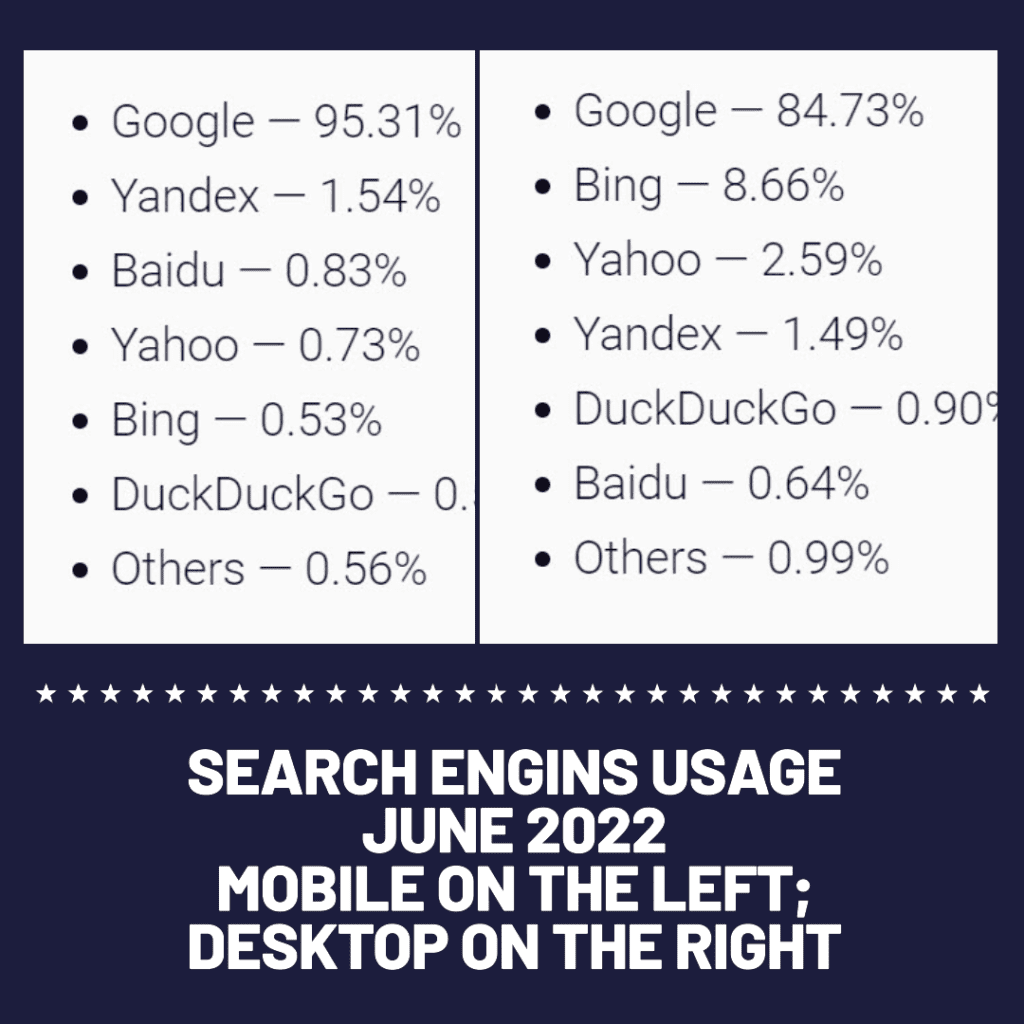
The search engine battle is alive and well. People often ask me two questions: which browser should I use and which search engine is best? I answer the browser question this way: “On my main Windows computer in the shop, I have ten (10) browsers installed. I often use them for specific functions. For example, I use Google Chrome when I want to work on my Google accounts. If I’m working on Microsoft accounts, I use Microsoft Edge.” (Note: I’ve done some posts on browser features you may not be using. You might want to check them out HERE.) Browser issues aside, this post is really about the search engine battle.
Before we move on, though, let’s clear up some definitions. A browser is software that converts web page code into something user-friendly. A search engine is a means of finding articles, pictures, and more on the Internet. The names we use are sometimes confusing. For instance, Google Chrome is a browser but Google Search is a search engine. Microsoft Edge is a browser while Bing is Microsoft’s search engine. DuckDuckGo’s browser and search engine are the same name! Nobody said the computing world is easy!!
Now, let’s explore what search engines are available.
The Search Engines (In No Particular Order)
- Google: Google is the most widely used search engine, known for its powerful search algorithms and extensive index of web pages.
- Bing: Bing is Microsoft’s search engine, offering web search, image search, video search, news search, and more.
- Yahoo: Yahoo Search is a search engine that provides search results powered by Bing. It also offers various other services such as email, news, and entertainment.
- Baidu: Baidu is a dominant search engine in China, offering web search, image search, video search, and more.
- Yandex: Yandex is a popular search engine in Russia, providing web search, image search, video search, maps, and other services.
- DuckDuckGo: DuckDuckGo is a privacy-focused search engine that emphasizes protecting user privacy by not tracking or storing personal information.
- AOL Search: AOL Search is a search engine that provides search results powered by Bing.
- Ask.com: Ask.com (formerly Ask Jeeves) is a search engine that allows users to ask questions and provides answers based on its index.
- Ecosia: Ecosia is a search engine that uses its profits to fund tree-planting projects globally.
- Startpage: Startpage is a privacy-oriented search engine that provides Google search results without tracking user information.
I’m willing to bet you haven’t even heard of all of the search engines I listed! Like browsers, I use search engines for particular functions. For instance, if I want to be able to search with some privacy, I use either DuckDuckGo or Startpage. If I want to help plant trees simply by searching, I use Ecosia.
The Good, The Bad, The Ugly
As is true with most things in life, each of these search engines has its share of advantages and disadvantages. It’s going to take a number of posts to go over each search engine. Since it’s the most popular engine, let’s start with Google.
Google Search Advantages
- Comprehensive search results. Google has a vast index of web pages, making it highly likely that you’ll find relevant information for your search query. It covers a wide range of topics and provides diverse sources of information.
- Fast and efficient. Google’s search algorithm is designed to deliver search results quickly, allowing you to find information within seconds. It processes search queries at an impressive speed, helping you save time.
- User-friendly interface. Google’s simple and intuitive search interface makes it easy for users to enter queries and navigate through the search results. The search engine’s design is streamlined, making it accessible to users with different levels of technical expertise.
- Advanced search features. Google Search offers various advanced features to refine and customize your search. You can use operators to narrow down results, or use quotation marks for exact phrase searches. Additionally, Google provides filters for time, location, and more.
- Multimedia search. Google not only indexes web pages but also catalogs images, videos, news articles, and other media formats. This enables users to find a wide range of media content related to their search queries, enhancing the overall search experience.
Google Search – Disadvantages
- Information overload. With a massive number of search results, it can be challenging to sift through them and determine the most accurate or reliable information. Users may need to spend additional time evaluating and verifying sources.
- Privacy concerns. Google collects and stores user data to personalize search results and serve targeted advertisements. This data collection raises privacy concerns for some users who are uncomfortable with the level of information Google retains about their search history and online behavior.
- Filter bubble effect. Google’s search results are tailored to individual users based on their past search behavior, location, and other factors. This customization can create a filter bubble, where users are predominantly exposed to content that aligns with their existing views and preferences, limiting exposure to diverse perspectives.
- Advertising dominance. As Google’s primary source of revenue comes from advertising, search results often display ads at the top or bottom of the page, which can make it harder to differentiate between organic search results and paid advertisements. This may impact the visibility of non-commercial content.
- Dependence on algorithmic rankings. Google’s search results are determined by complex algorithms that prioritize certain factors, such as relevance, authority, and popularity. This means that some high-quality but less prominent or optimized content may not receive the visibility it deserves, potentially impacting the discoverability of valuable resources.
The Search Engine Battle – Next Up
In the next post, we’ll look at the Bing search engine.
